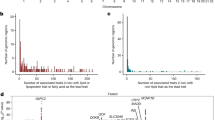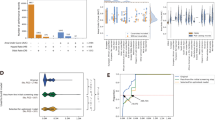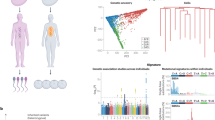Abstract
The fibroblast growth factor receptor 4 (FGFR4) is thought to be involved in many critical cellular processes and has been associated with prostate cancer risk. Four single nucleotide polymorphisms (SNPs) within or near FGFR4 were analyzed in a population-based study of 1458 prostate cancer patients and 1352 age-matched controls. We found no evidence to suggest that any of the FGFR4 SNP genotypes were associated with prostate cancer risk or with disease aggressiveness, Gleason score or stage. A weak association was seen between rs351855 and prostate cancer-specific mortality. Subset analysis of cases that had undergone radical prostatectomy revealed an association between rs351855 and prostate cancer risk. Although our results confirm an association between FGFR4 and prostate cancer risk in radical prostatectomy cases, they suggest that the role of FGFR4 in disease risk and outcomes at a population-based level appears to be minor.
This is a preview of subscription content, access via your institution
Access options
Subscribe to this journal
Receive 4 print issues and online access
$259.00 per year
only $64.75 per issue
Buy this article
- Purchase on Springer Link
- Instant access to full article PDF
Prices may be subject to local taxes which are calculated during checkout

Similar content being viewed by others
References
Ornitz DM, Xu J, Colvin JS, McEwen DG, MacArthur CA, Coulier F et al. Receptor specificity of the fibroblast growth factor family. J Biol Chem 1996; 271: 15292–15297.
Schlessinger J . Cell signaling by receptor tyrosine kinases. Cell 2000; 103: 211–225.
Acevedo VD, Gangula RD, Freeman KW, Li R, Zhang Y, Wang F et al. Inducible FGFR-1 activation leads to irreversible prostate adenocarcinoma and an epithelial-to-mesenchymal transition. Cancer Cell 2007; 12: 559–571.
Dorkin TJ, Robinson MC, Marsh C, Bjartell A, Neal DE, Leung HY . FGF8 over-expression in prostate cancer is associated with decreased patient survival and persists in androgen independent disease. Oncogene 1999; 18: 2755–2761.
Freeman KW, Gangula RD, Welm BE, Ozen M, Foster BA, Rosen JM et al. Conditional activation of fibroblast growth factor receptor (FGFR) 1, but not FGFR2, in prostate cancer cells leads to increased osteopontin induction, extracellular signal-regulated kinase activation, and in vivo proliferation. Cancer Res 2003; 63: 6237–6243.
Freeman KW, Welm BE, Gangula RD, Rosen JM, Ittmann M, Greenberg NM et al. Inducible prostate intraepithelial neoplasia with reversible hyperplasia in conditional FGFR1-expressing mice. Cancer Res 2003; 63: 8256–8263.
Gowardhan B, Douglas DA, Mathers ME, McKie AB, McCracken SR, Robson CN et al. Evaluation of the fibroblast growth factor system as a potential target for therapy in human prostate cancer. Br J Cancer 2005; 92: 320–327.
Kwabi-Addo B, Wang J, Erdem H, Vaid A, Castro P, Ayala G et al. The expression of Sprouty1, an inhibitor of fibroblast growth factor signal transduction, is decreased in human prostate cancer. Cancer Res 2004; 64: 4728–4735.
Leung HY, Dickson C, Robson CN, Neal DE . Over-expression of fibroblast growth factor-8 in human prostate cancer. Oncogene 1996; 12: 1833–1835.
Memarzadeh S, Xin L, Mulholland DJ, Mansukhani A, Wu H, Teitell MA et al. Enhanced paracrine FGF10 expression promotes formation of multifocal prostate adenocarcinoma and an increase in epithelial androgen receptor. Cancer Cell 2007; 12: 572–585.
Ozen M, Giri D, Ropiquet F, Mansukhani A, Ittmann M . Role of fibroblast growth factor receptor signaling in prostate cancer cell survival. J Natl Cancer Inst 2001; 93: 1783–1790.
Ropiquet F, Giri D, Kwabi-Addo B, Mansukhani A, Ittmann M . Increased expression of fibroblast growth factor 6 in human prostatic intraepithelial neoplasia and prostate cancer. Cancer Res 2000; 60: 4245–4250.
Sahadevan K, Darby S, Leung HY, Mathers ME, Robson CN, Gnanapragasam VJ . Selective over-expression of fibroblast growth factor receptors 1 and 4 in clinical prostate cancer. J Pathol 2007; 213: 82–90.
Tanaka A, Furuya A, Yamasaki M, Hanai N, Kuriki K, Kamiakito T et al. High frequency of fibroblast growth factor (FGF) 8 expression in clinical prostate cancers and breast tissues, immunohistochemically demonstrated by a newly established neutralizing monoclonal antibody against FGF 8. Cancer Res 1998; 58: 2053–2056.
Wang J, Cai Y, Penland R, Chauhan S, Miesfeld RL, Ittmann M . Increased expression of the metastasis-associated gene Ehm2 in prostate cancer. Prostate 2006; 66: 1641–1652.
Wang J, Stockton DW, Ittmann M . The fibroblast growth factor receptor-4 Arg388 allele is associated with prostate cancer initiation and progression. Clin Cancer Res 2004; 10 (18 Pt 1): 6169–6178.
Bange J, Prechtl D, Cheburkin Y, Specht K, Harbeck N, Schmitt M et al. Cancer progression and tumor cell motility are associated with the FGFR4 Arg(388) allele. Cancer Res 2002; 62: 840–847.
Matakidou A, El Galta R, Rudd MF, Webb EL, Bridle H, Eisen T et al. Further observations on the relationship between the FGFR4 Gly388Arg polymorphism and lung cancer prognosis. Br J Cancer 2007; 96: 1904–1907.
Spinola M, Leoni V, Pignatiello C, Conti B, Ravagnani F, Pastorino U et al. Functional FGFR4 Gly388Arg polymorphism predicts prognosis in lung adenocarcinoma patients. J Clin Oncol 2005; 23: 7307–7311.
Stadler CR, Knyazev P, Bange J, Ullrich A . FGFR4 GLY388 isotype suppresses motility of MDA-MB-231 breast cancer cells by EDG-2 gene repression. Cell Signal 2006; 18: 783–794.
Thussbas C, Nahrig J, Streit S, Bange J, Kriner M, Kates R et al. FGFR4 Arg388 allele is associated with resistance to adjuvant therapy in primary breast cancer. J Clin Oncol 2006; 24: 3747–3755.
Stanford JL, Wicklund KG, McKnight B, Daling JR, Brawer MK . Vasectomy and risk of prostate cancer. Cancer Epidemiol Biomarkers Prev 1999; 8: 881–886.
Agalliu I, Salinas CA, Hansten P, Ostrander EA, Stanford JL . Statin use and risk of prostate cancer: results from a population-based epidemiological study. Am J Epidemiol 2008; 168: 250–260.
Breslow NE, Day NE . Statistical Methods in Cancer Research. Volume I—The Analysis of Case-Control Studies. IARC Scientific Publications: Lyon, 1980, 360pp.
Cox DR . Regression models and life tables (with discussion). J Royal Stat Soc B 1972; 34: 187–220.
Desnoyers LR, Pai R, Ferrando RE, Hotzel K, Le T, Ross J et al. Targeting FGF19 inhibits tumor growth in colon cancer xenograft and FGF19 transgenic hepatocellular carcinoma models. Oncogene 2008; 27: 85–97.
Jezequel P, Campion L, Joalland MP, Millour M, Dravet F, Classe JM et al. G388R mutation of the FGFR4 gene is not relevant to breast cancer prognosis. Br J Cancer 2004; 90: 189–193.
Spinola M, Leoni VP, Tanuma J, Pettinicchio A, Frattini M, Signoroni S et al. FGFR4 Gly388Arg polymorphism and prognosis of breast and colorectal cancer. Oncol Rep 2005; 14: 415–419.
Rabbani SA, Xing RH . Role of urokinase (uPA) and its receptor (uPAR) in invasion and metastasis of hormone-dependent malignancies. Int J Oncol 1998; 12: 911–920.
Sidenius N, Blasi F . The urokinase plasminogen activator system in cancer: recent advances and implication for prognosis and therapy. Cancer Metastasis Rev 2003; 22: 205–222.
Acknowledgements
We thank all the men who participated in this study for their time, effort and cooperation. This work was supported by grants RO1 CA56678, RO1 CA82664, RO1 CA092579 and P50 CA97186 from the National Cancer Institute; additional support was provided by the Fred Hutchinson Cancer Research Center and the Intramural Program of the National Human Genome Research Institute.
Author information
Authors and Affiliations
Corresponding author
Additional information
This study was conducted within the Epidemiology Program of the Fred Hutchinson Cancer Research Center, Seattle, WA, USA. Genotyping was performed in the Comparative Genomics Section of the National Human Genome Research Institute, NIH, Bethesda, MD, USA.
Rights and permissions
About this article
Cite this article
FitzGerald, L., Karlins, E., Karyadi, D. et al. Association of FGFR4 genetic polymorphisms with prostate cancer risk and prognosis. Prostate Cancer Prostatic Dis 12, 192–197 (2009). https://doi.org/10.1038/pcan.2008.46
Received:
Accepted:
Published:
Issue Date:
DOI: https://doi.org/10.1038/pcan.2008.46
Keywords
This article is cited by
-
Effects of FGFR4 G388R, V10I polymorphisms on the likelihood of cancer
Scientific Reports (2021)
-
Prognostic significance of fibroblast growth factor receptor 4 polymorphisms on biochemical recurrence after radical prostatectomy in a Chinese population
Scientific Reports (2016)
-
Polymorphisms of FGFR1 in HBV-related hepatocellular carcinoma
Tumor Biology (2015)
-
Functional roles of fibroblast growth factor receptors (FGFRs) signaling in human cancers
Apoptosis (2013)
-
FGFR4 Gly388Arg polymorphism contributes to prostate cancer development and progression: A meta-analysis of 2618 cases and 2305 controls
BMC Cancer (2011)



